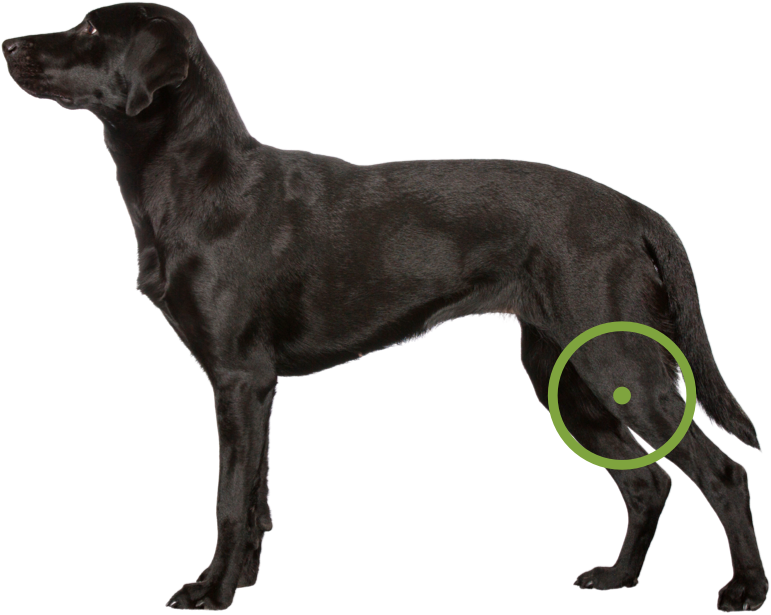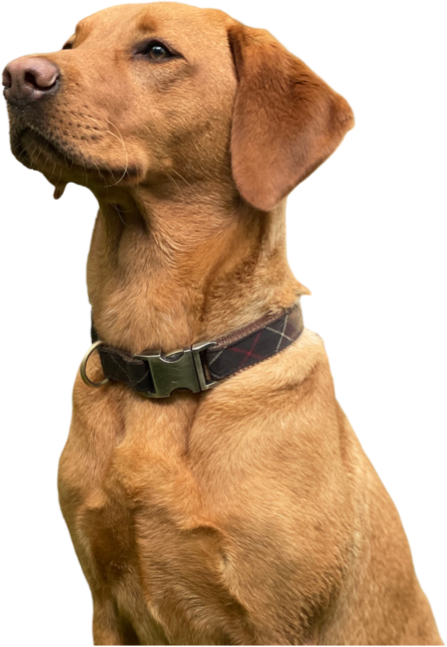What is patellar luxation?
Slipping kneecap in cats and dogs
Affecting both dogs and cats, patellar luxation is dislocation of the kneecap (patella). It is a complex part of their body, with bones, tendons and muscles all working in unison to keep the patella in the right place. If there is a malalignment in the bones above or below the knee, or an injury, then the patella can dislocate. This might be intermittent, causing the common scenario of an intermittent ‘skipping’ lameness. In more severe cases the patella may be permanently dislocated. Either way, the condition can cause discomfort and will predispose to osteoarthritis of the knee.
Patellar luxation is common in small breeds such as terriers and miniature poodles, but can also affect larger breeds such as Labradors. Most, but not all, cases will benefit from surgical stabilisation of the patella.
Patellar luxation is often considered a relatively straight-forward condition to correct by vets, but in order to minimise further damage to the knee and to maximise the chances of a good outcome it is important that the correct procedure is chosen and that it is executed well, which is not always straight-forward. Many patients are treated with a combination of procedures to deepen the groove the patella sits in (femoral trochlear sulcoplasty) and realign the patella tendon (tibial crest transposition). The latter procedure is particularly important to avoid recurrence, but is sometimes neglected. More complicated cases may require straightening (corrective osteotomy) of the femur (thigh bone) and/or the tibia (shin bone). Rarely, patients with severe damage to their femoral trochlear may need a femoral trochlear joint replacement. Choosing the right procedure for each patient requires experience and in some cases a CT scan.
Check-out Andy’s blog for a more detailed discussion on patellar luxation surgery.
For your peace of mind our patella surgery prices are a fixed-price and include the initial assessment, post-surgery support from our team and a six week follow-up appointment. Furthermore we are so confident of our surgical success rates that we offer a surgical guarantee after surgery on grade I-III cases: in the unlikely event your dog suffers a complication after surgery we will manage this free-of-charge (T&Cs apply). We do not know of any other specialist centre in the south east that can match us on price and offers such a guarantee.
Single side patella surgery, <20kg: £3,750
Single side patella surgery, 20-40kg: £4,000
See our Prices page for more information.

Why Moores Ortho?
Patella luxation correction is a technical procedure. In the right hands it is a very safe procedure but complications including recurrent dislocation are possible. We have performed hundreds of these surgeries with very good success rates.
At the Moores Orthopaedic Clinic we can offer:
- Expert assessment of your pet to ensure the right surgery is performed
- If your pet does not need surgery then we will happily advise you of this
- Highly experienced specialist surgeons. We have performed hundreds of patellar luxation surgeries, from the simple to the complex.
- A purpose-built modern clinic with facilities designed to minimise the risk of complications after orthopaedic surgery
- Detailed aftercare instructions and support during recovery including discounted physiotherapy packages
- Personal and professional service
- Very competitive pricing and a surgical guarantee for grade I-III/IV cases
What you can expect before and after surgery
At your initial appointment we will review your pet’s history and any x-rays, and thoroughly assess them. We will then be able to advise you on treatment options and costs. In some situations we will advise a CT scan to better assess the cause of the patellar luxation. Once your pet has been assessed we will be able to schedule surgery.
After surgery your pet will go home with a detailed postoperative care plan and any necessary medications.
Limitations in activity are essential, especially within the first few weeks. These will be detailed on the postoperative care plan. We will always be available for advice if you need us and we will ask you to return to the clinic to check on your pet’s recovery and progress.
After recovery, most dogs can expect a return to full fitness free from pain.

FAQs
Can my dog live with a luxating patella?
Some dogs with a low-grade patellar luxation can cope well without surgery, but they may get arthritis in their knee which is likely to be worse than if they are not treated surgically.
What is the most common cause of patellar luxation?
Most orthopaedic surgeons believe patellar luxation is genetic, as it is especially common in a selection of breeds.
What are the signs of patellar luxation?
An intermittent ‘skipping’ hindlimb lameness whilst walking or running is a common sign of patellar luxation, although signs can be hard to spot and vary greatly. If both kneecaps dislocate at the same time, dogs can have difficulty walking, adopting a crouched hindlimb gait.
At what age does luxating patella start?
It will generally start as a puppy, but the symptoms may not be noticed until a certain degree of damage has been caused to the patella.
Will my pet make a full recovery?
The majority of patients will recover fully after patellar luxation surgery, but to some extent it will depend on the condition of the joint before surgery and some patients will have persistent symptoms related to arthritis.
How much does it cost to fix a luxating patella in dogs?
The cost will vary greatly dependent on the degree of complexity of the condition. Our pricing however is very competitive compared to other centres. To help with your financial planning routine patella surgery is a fixed-cost procedure.
Will my insurance cover patellar luxation surgery?
Almost certainly yes, but do check your policy carefully in case there are any exclusions or limits on cover. If your pet has previously been diagnosed with a patella luxation (in either knee) and you have since changed insurance companies, then you may not be covered. If you are unsure about your level of cover then please let us know and we can investigate this for you.
Make an enquiry
Request more
information



